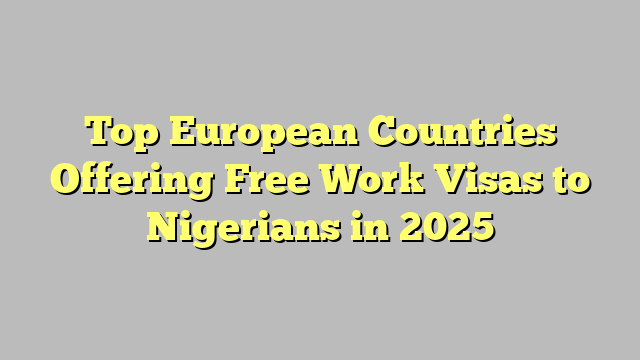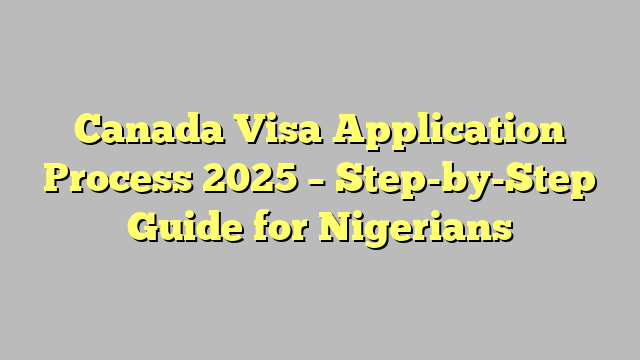In 2025, several European countries are opening their doors to foreign workers—particularly from countries like Nigeria—to help address labor shortages and declining populations. Some of these countries offer free or low-cost work visa programs, where visa processing fees are waived or covered by the employer. This guide explores the top European countries where Nigerians can get work visas with little or no application costs, along with job opportunities, eligibility, and application steps.
What Does “Free Work Visa” Mean?
A free work visa doesn’t always mean there’s absolutely no cost. It generally refers to situations where:
- Visa fees are waived by the country or employer
- The employer covers all or most visa costs
- The country simplifies the process and removes bureaucratic barriers
Nigerians looking to work in Europe in 2025 should focus on countries that:
- Need foreign workers urgently
- Are part of the Schengen zone with simplified labor migration policies
- Offer visa sponsorship jobs or direct employer-paid visas
1. Germany – Skilled Worker Visa
Germany is actively recruiting foreign professionals through its Skilled Immigration Act. It offers employer-sponsored jobs, especially in fields like healthcare, engineering, and construction.
Visa cost: €75 (often paid by employer)
Key sectors: Nursing, IT, electricians, mechanics, hospitality, logistics
Highlights:
- Employer often covers visa and relocation costs
- Shortage Occupation List boosts chances
How to apply: - Secure job offer
- Apply for a work visa with the German Embassy in Abuja or Lagos
- Submit required documents, attend interview, and wait for approval
2. Poland – National Work Visa (Type D)
Poland has one of Europe’s most open work visa systems, especially for unskilled and semi-skilled labor. Many employers cover visa and relocation expenses.
Visa cost: ~₦45,000–₦60,000 (employer often pays)
In-demand jobs: Factory workers, welders, packers, cleaners, drivers
Highlights:
- Fast processing (4–6 weeks)
- Employers issue work permits directly
Steps: - Find job through verified agency or employer
- Get work permit
- Apply for Type D visa at Polish embassy
3. Czech Republic – Employee Card
Czech Republic is experiencing workforce shortages in agriculture, factories, and the service sector. Nigerians with job offers are eligible for an Employee Card (combines work and residence permit).
Visa cost: ~₦50,000 (often reimbursed by employer)
Jobs in demand: Production line operators, cleaners, caregivers, warehouse workers
Perks:
- Long-stay residence + work permission in one
- Employer applies on your behalf
How to apply: - Secure job contract
- Submit application through Czech embassy or VFS office in Lagos
4. Portugal – Job Seeker Visa
Portugal introduced a Job Seeker Visa that allows Nigerians to travel to Portugal, stay for 120–180 days, and look for a job on the ground.
Visa fee: ~₦30,000–₦50,000 (varies; not always enforced)
Key roles: Construction, services, agriculture, tech startups
Benefits:
- No job offer required to apply
- If you get a job, visa converts to residence permit
Application steps: - Apply at Portuguese embassy in Abuja
- Show proof of funds and accommodation
- Travel and search for jobs in Portugal
5. Lithuania – Temporary Work Visa
Lithuania is aggressively recruiting foreigners for industrial jobs. Employers frequently process work permits and cover fees.
Visa cost: ₦30,000–₦50,000 (covered by employers in many cases)
Job openings: Truck drivers, warehouse assistants, cleaners, food packaging
Advantages:
- Employers submit application directly to Lithuanian Migration Office
- Visa allows long-term stay and work
Procedure: - Job offer → work permit → Type D visa application
6. Hungary – Seasonal Work Permit
Hungary has short-term and seasonal employment options. Employers typically handle all documentation and sometimes cover the visa fee.
Visa fee: ~₦35,000–₦50,000 (often covered)
Target sectors: Agriculture, construction, cleaning
Highlights:
- Simple requirements
- Fast-track processing via employer
How to apply: - Secure job offer from Hungarian company
- Submit visa application with proof of contract and accommodation
7. Romania – Long-Term Work Visa
Romania is experiencing severe labor shortages and offers work visa options to Nigerians through employers who sponsor the visa.
Visa fee: ~₦30,000–₦55,000 (commonly paid by employer)
Roles in demand: Factory workers, hospitality, janitors, farm hands
Key points:
- Employers obtain work permits in Romania
- You apply for visa with work permit approval letter
Steps: - Get offer + work permit
- Apply for long-stay work visa
8. Malta – Work Permit with Sponsorship
Malta offers visa sponsorship jobs to Nigerians in areas like caregiving, elderly assistance, and hotel services.
Visa cost: Covered by employer in most cases
Popular roles: Caregivers, kitchen helpers, waiters, cleaners
Benefits:
- Small English-speaking EU country
- Fast employer-based processing
Apply through: - Recruitment agencies or job portals like JobsPlus Malta
9. Estonia – Digital Nomad & Startup-Friendly Work Visas
Estonia is Europe’s tech hub, offering simple work visa routes to tech workers, freelancers, and startup founders.
Visa cost: ~₦35,000
Who qualifies: Developers, marketers, designers, online freelancers
Advantages:
- Simple online application process
- No employer sponsorship required for digital nomads
Steps: - Apply online or at the embassy
- Show proof of remote work income or business
10. Finland – Seasonal & Skilled Worker Visas
Finland seeks foreign workers to fill seasonal and technical positions. The work visa is usually sponsored by the employer.
Visa cost: ~₦50,000 (often covered)
Needed jobs: Farmers, gardeners, cleaners, welders, machine operators
Perks:
- Fast-tracked for urgent roles
- Multiple renewal options
Application: - Employer applies for the residence/work permit
- You attend biometric appointment at Finnish Embassy
Benefits of Choosing Employer-Sponsored Visas
- No out-of-pocket visa costs
- Employers guide you through application
- Increases visa approval chances
- Some offer flight tickets and accommodation
How to Find Free Work Visa Jobs in Europe
- Use government job portals like EURES (European Job Mobility Portal)
- Register on trusted platforms: LinkedIn, Glassdoor, GoAbroad, EuropeLanguageJobs
- Search for “visa sponsorship jobs in [country]”
- Attend virtual European job fairs targeting foreign workers
- Join expat and migrant job groups on Facebook
Red Flags and Common Scams
- Agents requesting payment for guaranteed visa or job
- Fake job offers without interviews
- Employers asking for application fees upfront
- No physical address or company registration
Tips:
- Always verify employers through official company registries
- Confirm job offers with embassies or consulates
- Avoid paying agents who make unrealistic promises
Final Thoughts
Several European countries are making it easier—and cheaper—for Nigerians to get work visas in 2025. With employer sponsorships, waived fees, and targeted recruitment drives, your dream of working in Europe is closer than ever. From Germany’s skilled worker program to Poland’s factory jobs and Portugal’s job-seeker visa, there are multiple opportunities to explore. The key is preparation: research the market, apply directly or through trusted agencies, and ensure all your documents are legit and ready.






